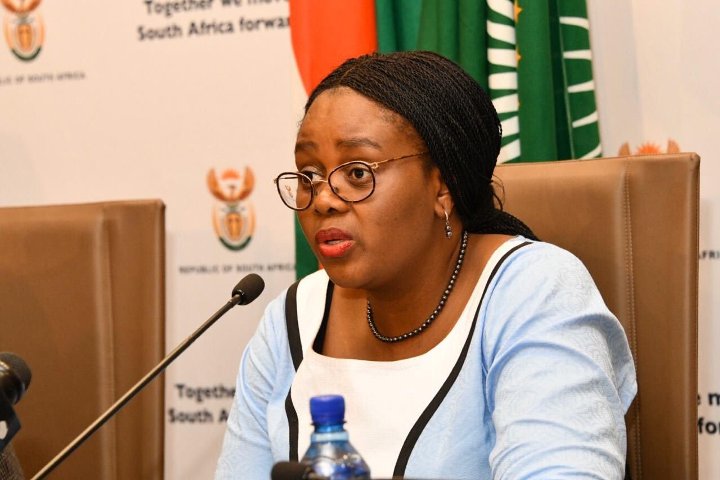Court Interpreters Honoured with Robes in Historic Justice System Milestone
The Court Interpreters’ Robes Programme is the first initiative of its kind worldwide, designed to formally acknowledge interpreters as essential officers of the court.

- Country:
- South Africa
In a groundbreaking initiative hailed as the first of its kind globally, Justice and Constitutional Development Minister Mmamoloko Kubayi has launched the Court Interpreters' Robes Programme, a bold step aimed at professionalising the role of interpreters and reaffirming their critical function in ensuring universal access to justice.
The event, held at the Kgosi Mampuru Correctional Centre in Pretoria on Tuesday, celebrated the men and women who serve as linguistic bridges in South Africa's courts—helping citizens exercise their constitutional right to a fair trial in a language they understand.
"Court interpreters are not merely linguistic facilitators. They are guardians of constitutional rights, ensuring that every person, regardless of language, background, or ability, has meaningful access to justice," said Kubayi.
A World-First Initiative to Elevate the Profession
The Court Interpreters' Robes Programme is the first initiative of its kind worldwide, designed to formally acknowledge interpreters as essential officers of the court. The robing ceremony symbolises professional dignity, ethical conduct, and institutional respect, placing interpreters alongside other key justice officials such as magistrates, prosecutors, and clerks.
Under the new framework, interpreters will adopt a professional dress code consisting of official black robes and a black-and-white uniform standard. This attire is not merely symbolic—it reflects the interpreters' elevated standing within the justice system and serves as a visible reminder of their impartiality and integrity.
"Your services are an integral part of the functioning of our courts, without which justice would not be served," Kubayi said, commending interpreters for their dedication under challenging conditions.
Language as a Vehicle for Justice, Not a Barrier
Kubayi underscored that language accessibility is central to achieving universal justice. South Africa's Constitution guarantees every person the right to use the language of their choice during legal proceedings—a right that can only be realised through the competence and presence of trained interpreters.
"Properly utilised, language interpretation in our courts can transform our language diversity from being a barrier to an instrument for empowerment, social cohesion, and a more just society," the Minister said.
She noted that South Africa's multilingual character—embracing 12 official languages—demands a justice system that reflects and respects this diversity. Interpreters, therefore, play a crucial role in bridging linguistic divides, especially in communities where English is not the first language.
From Apartheid-Era Marginalisation to Democratic Recognition
In her address, Kubayi reflected on how language interpretation under apartheid often served as a mechanism of control rather than inclusion. By contrast, the democratic era has reframed interpretation as a tool for human rights and dignity.
"As part of the justice system, court interpreting must also demonstrate a shift from language interpretation under the unjust system of apartheid to language interpretation in a democracy that embraces human rights and diversity," she emphasised.
The robing initiative, therefore, is more than ceremonial—it represents historical redress and institutional transformation, aligning with the values of equality and respect enshrined in the Constitution of the Republic of South Africa.
Training, Professionalism, and Ethical Standards
To sustain this transformation, the Department of Justice and Constitutional Development (DoJ&CD), through Justice College, will continue to deliver foundational and advanced training for court interpreters. This includes:
-
Language proficiency and legal terminology courses
-
Ethical conduct and confidentiality standards
-
Professional development workshops
-
Continuous learning in multilingual and multicultural communication
Kubayi called on interpreters to uphold the highest ethical and professional standards, reminding them that they stand at the coalface of the judiciary, directly influencing how justice is delivered.
"Faced with the challenge of huge case backlogs, our courts cannot afford to have court interpreters who do not understand the importance of pulling their weight to improve court efficiency," she cautioned.
She further invoked the Batho Pele principles—the public service ethos that prioritises people first—as a guiding philosophy for interpreters in their daily duties.
Ensuring Efficiency in the Justice System
Court interpreters often operate in high-pressure environments, translating complex testimony and legal arguments in real time. Their precision can affect case outcomes, procedural fairness, and the speed at which cases are resolved.
By recognising their professional status through formal robing, the Department aims to motivate interpreters, improve morale, and enhance efficiency in the judicial system—especially at a time when case backlogs remain a national challenge.
Kubayi reaffirmed that the initiative reflects the government's broader commitment to modernising and professionalising the justice sector, making it more accessible and accountable to all South Africans.
A Transformative Moment for Justice in South Africa
The Court Interpreters' Robes Programme marks a historic turning point in how South Africa views the role of interpreters—not as peripheral staff, but as cornerstones of justice delivery. The initiative also sets a global precedent for recognising language professionals within judicial systems.
"Government's decision to take this step is motivated by the recognition of the immense responsibility interpreters carry in upholding justice," Kubayi said. "You must carry out your tasks professionally, ethically, and without prejudice."
As interpreters don their robes for the first time, they do so not only as representatives of the judiciary but as symbols of equality, dignity, and inclusivity—embodying the very spirit of South Africa's democracy.








